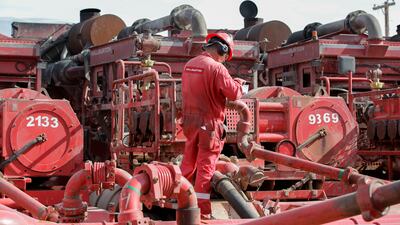Oilfield services companies Halliburton and Schlumberger halted their operations in Russia, citing the safety of employees across the region amid the country's military offensive in Ukraine.
The escalating situation will carefully be monitored, and there are no timetables given for any return to normal operations, the Texas-based companies said on their respective websites.
"We have watched with immense concern as the conflict in Ukraine has escalated. First and foremost, we are deeply focused on the health, safety and security of our employees, colleagues and their families in Ukraine, Russia and throughout the region," said Olivier Le Peuch, chief executive of Schlumberger.
"As the situation has developed, we have been evaluating our path forward, and have decided to immediately suspend new investment and technology deployment to our Russia operations. We continue to actively monitor this dynamic situation and will fulfil any existing activity in full compliance with applicable international laws and sanctions."
Halliburton, meanwhile, said it has "immediately" suspended future business in Russia as the company complies with sanctions that prohibit transactions and work, "including for certain state-owned Russian customers". The company had already stopped all shipments of specific sanctioned parts and products to Russia several weeks ago.
"We have employees in both Ukraine and Russia, and the conflict greatly impacts our people, their families, and loved ones throughout the region. Since the start of this conflict, we prioritised employee safety and compliance with all relevant sanctions," said Jeff Miller, chief executive of Halliburton.
The moves from Halliburton and Schlumberger mark the latest in a string of departures from Russia by international companies spanning key industries including retail, technology and services, as a response to their military offensive in Ukraine. Various US and EU restrictions on providing oil technology to Russia or importing its energy products are also in place.
Baker Hughes, another Texas-based oilfield services major, has so far not stated anything regarding its Russia operations.
chief executive of Schlumberg
Energy companies BP, Shell, Exxon Mobil and Equinor have either suspended their businesses in Russia or announced plans to exit their operations in the country.
The conflict has sent commodities to new highs, with oil prices touching their highest level since 2008 — soaring past $130 a barrel on March 6 — after US President Joe Biden banned crude, gas and coal imports from Russia, in retaliation for Moscow's invasion of Ukraine.
On Friday, Brent crude futures settled up 1.2 per cent at $107.93 a barrel, a day after jumping nearly 9 per cent in the biggest daily percentage gain since mid-2020. US West Texas Intermediate crude futures settled up 1.7 per cent at $104.70 a barrel.
The International Energy Agency this week also gave a warning that Russia — one of the world's biggest producers of oil and gas — could lose 30 per cent of its oil output within weeks.
Russia's actions have also caused surges in prices of food, which could push more than 40 million people into extreme poverty, the Centre for Global Development said on Friday.


